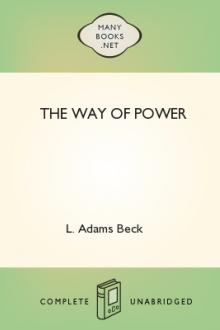The Way of Power, L. Adams Beck [beach books txt] 📗

- Author: L. Adams Beck
- Performer: -
Book online «The Way of Power, L. Adams Beck [beach books txt] 📗». Author L. Adams Beck
I thought he would drop into a cataleptic sleep, but no. From time to time he pressed his hand against his forehead. I experienced a sudden shock. A slight phosphorescent cloud formed, from which semblances of hands seemed to come and go with great rapidity. In a few minutes they lost their vaporous appearance and resembled human hands. Some became as it were more material; others more luminous. I counted sixteen.
When I asked if I could touch them, one breaking away from the rest flew toward me and pressed my hand. It was small, supple and moist, like the hand of a young woman. It threw a rosebud at my feet and vanished.
For nearly two hours a scene ensued calculated to set my head in a whirl. A hand brushed my face or fanned it with a fan. It would scatter a shower of flowers or trace in the air characters of fire; words which vanished as the last letter was written. Some of these were so striking that I wrote them down hastily. (They were in Sanskrit.)
“I have clothed myself with a fluidic body.”
“You will attain bliss when you lay aside this transitory body.”
Meanwhile flashes of lightning seemed to dart about. Gradually the hands disappeared; we found a garland of those yellow flowers with penetrating perfume [marigolds] which the Hindus use in all their ceremonies.
I offer no explanation. I relate. The doors of both rooms were closed. I had the keys in my pocket and the faquir had not changed his position. To these succeeded two others.
A cloud hovered near the little brazier, which at the Hindu’s request I had fed. It assumed the human form of an old Brahmin priest kneeling; the sign of Vishnu on his forehead, girdled with the triple cord. He seemed to pray. He took a pinch of perfumed powder and threw it on the coals. It emitted a thick smoke; when it dispersed I noticed the specter less than six feet distant. It held out its hands; I took them in my own and found them warm and human. “Are you,” I asked, “a former inhabitant of the earth?” The word “Yes” (_Am_) appeared and disappeared in letters of fire on his bosom.
“Will you leave me something as a token?”
He broke the triple cord, gave it to me and faded away. I supposed the s�ance was over and was going to raise the movable curtains which shaded the terrace, for the heat was suffocating. Suddenly I heard a strange tune. I saw the phantom of a musician gliding along the wall. He held a harmoniflute, which appeared impossible, as the Peishwa had sent for his the day before. When he had made the circuit of my room and the terrace he disappeared and I found the instrument where he had vanished. It was actually the Rajah’s harmoniflute.
Govindaswami then rose. He was covered with perspiration and seemed exhausted. He accepted my presents, made the parting salaam and disappeared. I threw myself on a hammock for a few hours’ rest. When I woke and remembered, it seemed a dream. Yet there was the harmoniflute. The floor of the terrace was still strewn with flowers, the garland lay on the divan and the notes I had written had not vanished.
�
Jacolliot in an interesting passage gives the conditions in which the true yogins operate. These should be noted. They are as follows:
They are accompanied by no assistant or confederate.
They are completely naked save for a small piece of linen about as large as the hand.
They are acquainted with none of the apparatus our European jugglers need.
They have nothing in their possession but a small wand of seven knots of young bamboo as big as the handle of a penholder, which they hold in the right hand, and a small whistle about three inches long which they fasten to one of the locks of their long straight hair, for, having no clothes, they must otherwise hold it.
They operate as the person they visit desires, either sitting or standing or on the marble, granite or stucco pavement of the veranda or the bare ground.
When they need a subject for magnetic or somnambulistic phenomena they take any of the servants you may choose, or a European if he is willing to serve.
If they need any article such as a musical instrument, a cane, a paper, a pencil, etc., they will ask you to furnish it.
They will repeat any experiments in your presence as many times as you require and will submit to any test.
They never ask any pay, merely accepting as alms for their temple whatever you choose to offer.
I have traveled in every direction for many years and can truthfully state that I have never seen a single faquir who was not willing to comply with these conditions.
�
Jacolliot is no believer himself in spiritualism in the ordinary sense of the word. It is true that many of the performers claim, as above, that these supernormal feats are done by “spirit force” which they some of them, as above, interpret as the power of the Pitris, the ancestral spirits. Jacolliot, however, writes:
�
I will say what I mean by the words “spirit force.” I mean the alliance between the intellect and the spiritual in order to act upon inanimate objects, without predetermining in any way the cause which sets this force in motion.
The supreme cause of all phenomena according to the Brahmins is the pure akasha fluid which is diffused through nature and puts animate and inanimate beings in communication with each other. Heat, electricity, all the forces of nature are but modes of action and states of this fluid. The being who possesses an excess of it acquires a proportionate power over animate beings not so highly favored and over inanimate beings. Spirits themselves are sensible to this influence.
According to some Brahmins akasha is the moving thought of the Universal Soul directing all souls, who would be in constant communication with each other if the gross envelope of the body did not in a measure prevent. Thus the more the soul disentangles itself from the body by contemplation the more sensible it becomes. to this Universal fluid by which all beings, visible or invisible are united. I confine myself to the r�le of an interpreter and nothing more.
So writes Jacolliot. He adds:
As to the last class of cases (apparitions and the production of material objects) I should have omitted them altogether from the present work, as shunning scientific investigation if (remembering that all religions with Christianity at their head included such phenomena in their mysteries and miracles) I had not thought it would be at least a matter of historical curiosity to set forth the nature of these singular practices—in common use in India at the present day—which are so well adapted to influence the popular mind and which formed the basis of all the ancient superstitions.
It will be observed that Jacolliot is very cautious in his manner of statement and rightly so. He calls however for investigation and I believe he would have done so more loudly had he lived in the present day and seen the advance of science along lines which would have appeared to him equally miraculous with those which the faquir developed before him in the palace of the Peishwa in Benares. I recommend all to read his book “Occult Science in India,” the first and longer part of which is devoted to examining the resemblances between supernormal beliefs in various parts of the world. All must draw their own conclusions but I think myself justified in describing him as a believer in the existence of some powerful and universal force which can be used by certain people and in certain conditions to produce results which the uninstructed would describe as “miraculous.”
Hypnotism has been mentioned in connection with some of these phenomena which I have quoted. What is the object of connecting hypnotism with the occult since it is known to be allied with certain physical processes? It may be said: “Yes, hypnotism was once considered occult but is now transferred to the domain of science. Why consider it in such a book as this?”
My answer is that I think every manifestation of the true occult is on its way to recognition in the domain of science, and by science I mean the knowledge which understands causes and processes and can therefore use them to its own ends. But because it is obvious that this definition applies very partially to the science of the present day, which is ignorant as a child in presence of the matters that most seriously concern us, I believe the science of the future will be placed on a very different basis from that of today. It will be based on the consciousness of man rather than on his sense perceptions. But there is another reason why hypnotism should be discussed in a book on the occult. It is a fact that anything which lulls the reason—i.e., the objective guardian of the ordinary ego—to sleep, may be and often is a straight way to the Land behind the Looking Glass. Only a temporary way, be it understood. The path vanishes as the sleeper wakes. He may never find it again unless under the same condition or further along the path of evolution, but for the moment the mirror on which the senses project their show is cracked and he sees through it. And here also we touch one of the differences between the East and West—which is very material to the subject in hand, though of course in each case there are exceptions. In the West the hypnotizer imposes his own will on the subject. He causes him to act, to remember as he chooses; the subject becomes a mere vehicle for the impressions of the operator. And if those are concerned with obtaining certain results or the proof of a theory, nothing more than these can be expected from the subject. The results therefore in the West are not especially interesting and can be predicted.
In the East amongst those who are adepts in the subject, the process is quite different. There is no imposition of the practicer’s will upon the subject. The intention is to send the objective self to sleep and so to set the higher consciousness of the subject free for his own experiences according to the power and vision he possesses in himself. The word of power is: “I loose you. Go.” It is obvious that very much more interesting and unexpected results can be had upon these lines though of course they will be strictly conditioned by the stage of psychic evolution reached by the subject. The cases which I have given from Ibn Batuta and the Emperor Jehangir may have some relation to this, and I very much wish I had space for the results of self-hypnosis in this connection. I think there is no doubt that in some of the low forms of Yoga—or what may be better called its baser imitations, there is a great deal of self-hypnosis and the results are what might be expected. I am inclined also to think that some of the crimes of our





Comments (0)